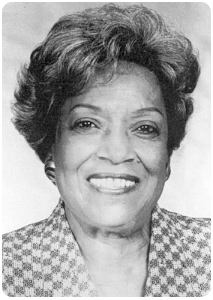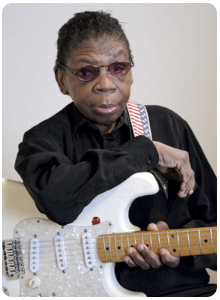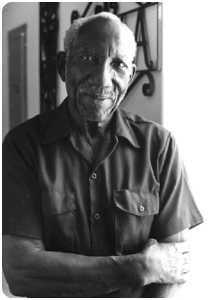 Born into a family of educators in Chester, S.C., Vivian Ayers has spent her life
embracing languages and their relationship with the arts. One of her most treasured
accomplishments was a Pulitzer Award nomination in 1952 for her poetry. Trained as
a librarian at Rice University, Ayers was granted faculty status in 1965, becoming
the first African American to do so. In 1972, her work, "Workshops in Open Fields,"
was hailed and recommended to the nation as a "prototype of grassroots programming"
by the director of the National Endowment of the Arts. Ayers established the Adept
New American Museum - a museum for art and history of the American Southwest. Ayers
reared a successful family, with three of her children going into the performing arts
- jazz musician Tex Allen, Tony-award winning actress Phylicia Rashad, and famed dancer
Debbie Allen. Her younger sister is Rep. Bessie Moody-Lawrence, of of the first African-Americans
to earn tenure at Winthrop.
Born into a family of educators in Chester, S.C., Vivian Ayers has spent her life
embracing languages and their relationship with the arts. One of her most treasured
accomplishments was a Pulitzer Award nomination in 1952 for her poetry. Trained as
a librarian at Rice University, Ayers was granted faculty status in 1965, becoming
the first African American to do so. In 1972, her work, "Workshops in Open Fields,"
was hailed and recommended to the nation as a "prototype of grassroots programming"
by the director of the National Endowment of the Arts. Ayers established the Adept
New American Museum - a museum for art and history of the American Southwest. Ayers
reared a successful family, with three of her children going into the performing arts
- jazz musician Tex Allen, Tony-award winning actress Phylicia Rashad, and famed dancer
Debbie Allen. Her younger sister is Rep. Bessie Moody-Lawrence, of of the first African-Americans
to earn tenure at Winthrop.
 As long as he can remember there has been music in Johnny King's life. A musician
now for 50 years, King has traveled the world playing music. He moved to New York
in the late 1960's, and then joined the Bill Doggett band. A few year's later, he
and his friends put together the Fatback Band. Some of King's best memories involve
opening his first guitar school in 1975 in St. Albans, N.Y.. He returned to Rock Hill
where has has operated an electronics shop for 18 years as well as a Gospel recording
studio for young musicians. Eager to recognize other musicians' contributions, King
helped form the Rock Hill Musicians Club. The group has celebrated other Rock Hill
musicians' work through performances and establishment of a park. King continues to
play with a combo of Winthrop faculty members for area events, and he says, "The music
is stronger than ever."
As long as he can remember there has been music in Johnny King's life. A musician
now for 50 years, King has traveled the world playing music. He moved to New York
in the late 1960's, and then joined the Bill Doggett band. A few year's later, he
and his friends put together the Fatback Band. Some of King's best memories involve
opening his first guitar school in 1975 in St. Albans, N.Y.. He returned to Rock Hill
where has has operated an electronics shop for 18 years as well as a Gospel recording
studio for young musicians. Eager to recognize other musicians' contributions, King
helped form the Rock Hill Musicians Club. The group has celebrated other Rock Hill
musicians' work through performances and establishment of a park. King continues to
play with a combo of Winthrop faculty members for area events, and he says, "The music
is stronger than ever."
 Early in 2008 the Charlotte Chamber of Commerce handed out its innovator of the year
for the city of Charlotte. The winner: Michael Marsicano. He won earlier awards for
building economic empowerment and bridging racial divides from the Urban League of
Central Carolinas, as one of the city's most influential leaders from Charlotte Magazine,
and for his philanthropic commitment to the Latino community. For the past two years,
Marsicano has been invited to the Sundance Preserve with about 30 other public and
private sector leaders to explore national arts policy issues. As president and CEO
of the Foundation of the Carolinas since 1999, Marsicano oversees a 50-person staff
and a $5.8 million annual budget. His organization administers funds for the Foundation
for the Arts and Sciences, the United Way Legacy Foundation, and Foundation for the
Charlotte Jewish Community. He holds a doctorate degree in public policy sciences,
a master's degree in counseling psychology, and a psychology degree, all from Duke
University.
Early in 2008 the Charlotte Chamber of Commerce handed out its innovator of the year
for the city of Charlotte. The winner: Michael Marsicano. He won earlier awards for
building economic empowerment and bridging racial divides from the Urban League of
Central Carolinas, as one of the city's most influential leaders from Charlotte Magazine,
and for his philanthropic commitment to the Latino community. For the past two years,
Marsicano has been invited to the Sundance Preserve with about 30 other public and
private sector leaders to explore national arts policy issues. As president and CEO
of the Foundation of the Carolinas since 1999, Marsicano oversees a 50-person staff
and a $5.8 million annual budget. His organization administers funds for the Foundation
for the Arts and Sciences, the United Way Legacy Foundation, and Foundation for the
Charlotte Jewish Community. He holds a doctorate degree in public policy sciences,
a master's degree in counseling psychology, and a psychology degree, all from Duke
University.
 Fascinated by the ironwork in his home community of Charleston, SC, Simmons is now
the most celebrated of Charleston ironworkers. He received his most important education
from local blacksmith Peter Simmons, where he learned the values and refined talents
that would sustain him through his long metalworking career. Moving into the specialized
fields of ornamental iron in 1938, Simmons fashioned more than 500 decorative pieces
of ornamental wrought iron: gates, fences, balconies, and window grills. From end
to end, downtown Charleston is truly decorated by his hand. In 1982, the National
Endowment for the Arts awarded him its National Heritage Fellowship, the highest honor
that the United States can bestow on a traditional artist. The S.C. legislature followed
with a "lifetime achievement" and commissions for public sculptures by the South Carolina
State Museum and the city of Charleston. Pieces of his work have been acquired by
the National Museum of American History and Smithsonian Institution, among others.
His downtown church, St. John's Reformed Episcopal Church, has dedicated its grounds
with a commemorative landscape garden as a tribute.
Fascinated by the ironwork in his home community of Charleston, SC, Simmons is now
the most celebrated of Charleston ironworkers. He received his most important education
from local blacksmith Peter Simmons, where he learned the values and refined talents
that would sustain him through his long metalworking career. Moving into the specialized
fields of ornamental iron in 1938, Simmons fashioned more than 500 decorative pieces
of ornamental wrought iron: gates, fences, balconies, and window grills. From end
to end, downtown Charleston is truly decorated by his hand. In 1982, the National
Endowment for the Arts awarded him its National Heritage Fellowship, the highest honor
that the United States can bestow on a traditional artist. The S.C. legislature followed
with a "lifetime achievement" and commissions for public sculptures by the South Carolina
State Museum and the city of Charleston. Pieces of his work have been acquired by
the National Museum of American History and Smithsonian Institution, among others.
His downtown church, St. John's Reformed Episcopal Church, has dedicated its grounds
with a commemorative landscape garden as a tribute.